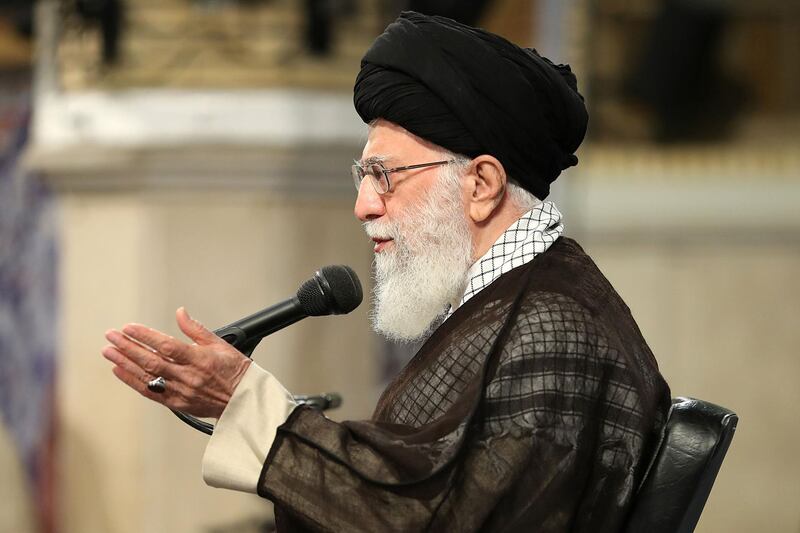Tensions were on the rise on Monday after mystery strikes in Syria reportedly claimed the lives of tens of Iranian pro-regime fighters.
Iran’s supreme leader Ayatollah Ali Khamenei responded to the air assault by threatening retaliation in the event of a military confrontation.
The Iranian leader was quick to play the blame game, accusing the Trump government and new US Secretary of State Mike Pompeo, who was in Jordan on Monday, of “trying to provoke Saudi Arabia and some regional states to confront the Islamic Republic.
“These regional countries should know that if they face the Islamic Republic, they will be definitely defeated," he said.
"Americans are the ones who should leave ... the Middle East, the west of Asia and the Persian Gulf is our home.”
The strikes, according to the Syrian official news agency, took place around 10:30pm local time on Sunday and were executed by "enemy missiles".
The Syrian semi-official newspaper, Tishreen, claimed the attack was carried out by the US and the UK from their bases in Jordan. On Monday, however, the UK Defence Ministry denied carrying out the attack, while Jordan's government blasted the "fabricated lies", adamant that its territory had not been used to carry out strikes.
In Washington, the Pentagon initially declined to comment, while the US Central Command told the Tampa Bay Times "it wasn't aware of any [military] action near Hama".
Asked later on Monday if the US “assist[ed] with any jamming of radar, or any cyber” in relation to the strikes, Defence Secretary James Mattis said: “We had nothing to do with the strike last night.”
Mattis on strike near Hama last night in Syria: "We had nothing to do with the strike last night." My question was: "Did you assist with any jamming of radar, or any cyber." Strike believed to be carried out by the Israeli warplanes, targeted Iranian weapons stored in Syria.
— Jennifer Griffin (@JenGriffinFNC) April 30, 2018
The attack was big enough to be recorded by earthquake centres. The European infrastructure for seismological products registered a 2.6 Richter scale earthquake east of Hama and South of Aleppo.
_______________
Read more:
Mostly Iranians killed in Syria strikes, monitor says
Syrian army says ‘enemy’ rocket attacks strike at military bases
Russia accuses US of trying to divide Syria
______________
Social media accounts showed videos of massive explosions and fire rocking the area amid conflicting reports regarding the targets hit, the death toll and the identity of those killed.
Local reports said the base in Hama was home to the regime's 47th Brigade and that Iranian military cadres helping President Bashar Al Assad were present in the area.
Early reports by ISNA (Iranian students news agency) concluded that 18 Iranians were killed. The report was subsequently removed and replaced by a different piece claiming that 40 to 60 Syrians were killed - but made no mention of Iranian casualties.
"No Iranian adviser has been martyred in last night's missile attacks in Hama and Aleppo provinces," Iran’s FARS news agency said.
The denial downplays the geopolitical impact of the attack, and lowers chances of Iranian retaliation.
The New York Times reported that 11 Iranians were killed, while the Syrian Observatory for Human Rights put the total death toll at 26.
Multiple strikes appeared to have hit several command centres belonging to Iranian-backed militias, an intelligence source told Reuters. The attack targeted arms caches, surface-to-surface missiles and munition warehouses.
Israel, who has reportedly carried out similar attacks in the past, did not claim responsibility.
But the assault did bear the hallmarks of an Israeli operation, the Syrian Observatory for Human Rights said.
"Given the nature of the target, it is likely to have been an Israeli strike," said Mr Rahman.
The number and frequency of missile strikes targeting Syria increased in April, with the US, UK and France carrying joint strikes on April 6, as well as alleged Israeli attacks.
Mr Mattis told Congress last week that an Israel-Iran confrontation “is very likely in Syria because Iran continues to do its proxy work there through Hezbollah”.






